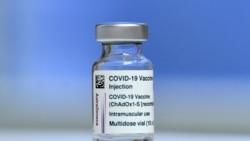On February 14, Brazil’s former citizenship minister, Osmar Terra, who continues to advise the government about the coronavirus pandemic on an informal basis, wrote on Twitter that the United Kingdom will be among the first countries to end COVID-19’s spread thanks to “herd immunity.”
“Herd immunity” is reached when the number of people infected with a disease become immune to it and makes its further spread unlikely.
Terra, a doctor whom Brazil's opposition calls a “COVID-19 denialist,” claimed that “the most infectious strain of the virus has already immunized over 60% of the population” in the U.K. He said government-imposed lockdowns imposed in March and November there failed to slow deaths and that vaccines haven’t had time to take effect.
His statements are unsupported and misleading. Polygraph.info analyzed three of his claims.
Since early 2020, Brazil’s government has been criticized internationally for how it has handled the coronavirus pandemic. Terra, like other supporters of nationalist President Jair Bolsonaro and the president himself, have repeatedly claimed that the risks from COVID-19 are blown out of proportion, dismissed scientifically proven responses, and boosted unproven – and sometimes dangerous – alternatives. The government’s disinformation has contributed to making Brazil's response to the pandemic one of the world’s worst.
Terra's claim that the U.K. is on its way to reaching herd immunity serves to deflect from the failure of the Bolsonaro government’s response. According to BBC News, experts estimate the true number of deaths in Brazil is 50% higher than the official count, which now stands second only to the United States at more than 242,000.
The U.K. coronavirus variant
The new U.K. COVID-19 variant – B.1.1.7 – was first detected in September 2020 in southeast England. It rapidly spread around the nation and has been detected in 82 countries, including the United States.
A study released in December by the Center for Mathematical Modeling of Infectious Diseases at the London School of Hygiene and Tropical Medicine said the U.K. COVID-19 variant is 56% more contagious than the original strain and warned that new control measures, including accelerating vaccine rollout and closing schools, might be necessary to curb it. Other studies of the U.K. variant have reached a similar conclusion, estimating it could be 30% to 70% more contagious.
Studies have also found the U.K. variant could be deadlier. A January report by the U.K. government’s scientific advisers – assessed by the New and Emerging Respiratory Virus Threats Advisory Group (NERVTAG) – concluded there is a “realistic possibility” the new variant “is associated with an increased risk of death” of perhaps 30%.
Polygraph.info could find no data showing that B.1.1.7 “has already immunized over 60% of the population,” as Terra claimed. However, according to some reports, the U.K. variant is becoming the dominant one in the nation and had caused more than 60% of the coronavirus infections in London by December 2020.
According to the U.K.’s office for national statistics, a survey showed that as of February 16, as many as 1 in 5 people in England tested positive for antibodies against SARS-CoV-2, “suggesting they had the infection in the past or have been vaccinated.” In Wales, Northern Ireland and Scotland, the antibody rate ranged from 10% to 16.6%.
So, while some may have developed immunity by being infected at some point, the population is far smaller than 60%. Moreover, a person can be infected with COVID-19 and not develop antibodies for the virus, meaning some cases don't contribute to "herd immunity."
Vaccines
Terra claimed in his tweet that the effects of the COVID-19 vaccine haven’t appeared in the U.K. Although the data is unclear, more than 16 million people there have received shots, and the fact that cases are slowing suggests vaccination has had some impact.
A BBC News analysis showed that COVID-19 deaths in the U.K. “are falling faster for vaccinated than unvaccinated groups,” with a 53% decline among those 80 years and older between January 28 and February 11, compared to a 44% decline among those younger than 80. However, the differences among age groups are not so sharp when it comes to the number of cases and hospitalizations.
An analysis published on February 3 of the Phase III clinical trials of AstraZeneca’s vaccine, developed with Oxford University, showed that its efficacy was 76% after the first of two doses. (Vaccine efficacy measures the percentage of reduction in cases of disease compared to a group that did not receive a vaccine.) It also showed that an interval of three months between the two shots could raise the vaccine’s efficacy rate to 82%.
In the early stages of the pandemic, the U.K.’s chief science adviser called for allowing the coronavirus to spread to reach herd immunity, but the British government subsequently backed away from the idea.
Lockdowns in the U.K.
Terra said lockdowns in the U.K. failed to prevent coronavirus deaths, and pointed to a Worldometer graph showing an increase in the number of daily deaths after March and November 2020 lockdown orders.
However, the former Brazilian citizenship minister did not mention that the U.K. is now under its third lockdown since mid-December, and that scientists credit it for fewer cases and a lower “R number,” which measures infectiousness, the Financial Times reported.
The R number estimates how many people one infected person will pass the virus to. If the R value is greater than one, it means the number of cases will increase. According to the latest British government statistics, the R number across the U.K. is ranging between 0.7 and 0.9, meaning fewer infections.
Context is important when talking about lockdown orders. U.K. Prime Minister Boris Johnson announced the first lockdown on March 23, 2020, under which people could leave their houses to buy food or medicine, exercise once a day, go to medical appointments and work if strictly necessary. Non-essential businesses were ordered closed.
But Britain was one of the last countries in Europe to institute lockdowns, and Johnson was criticized for delaying the step and not taking the pandemic seriously. The U.K. reported a spike in deaths during spring of 2020.
Lockdowns alone don’t curb the virus. They must be accompanied by other measures, including testing and tracing and vaccination. According to Our World in Data, in early April 2020, the U.K. was performing 0.27 tests per 1,000 people. Three months after the first lockdown, Johnson announced “the next stage” of the fight against coronavirus to “replace national lockdowns with individual isolation and, if necessary, local action where there are outbreaks.” The new stage included an increase in testing and tracing through the United Kingdom National Health Service’s (NHS) Test and Trace system.
Last July, Johnson rejected criticism that NHS Test and Trace was not doing an adequate job, insisting that the “system is as good as, or better, than any other system anywhere in the world” and would “play a vital part in ensuring that we do not have a second spike [in the] winter.” On November 5, when the second lockdown was imposed, the testing ratio was up to 4.27 per 1,000 people. Deaths were also rising.
A Reuters investigation found that “a disjointed design and a government preference, contrary to some expert advice, for national solutions over targeted, local responses” led to the U.K.’s failure to stop the spread. Testing and tracing expanded in an inefficient way, hindering the government from keeping pace with infections.
According to Reuters, “England has managed to trace just one non-household contact – someone who doesn’t live with the infected person – for every two identified cases of COVID-19. That compares to over 20 contacts for each single case in Singapore and Taiwan, according to studies.”
Osmar Terra’s recent tweet was not the first time the former Brazilian citizenship minister has made inaccurate predictions or disseminated false information about the coronavirus pandemic. In April 2020, the fact checking agency Agencia Lupa rejected as false his claims that the Netherlands had passed the peak and reached the end of the COVID-19 pandemic without closing any stores.
Terra left the Ministry of Citizenship on February 14, 2020, due to a restructuring of the government by Bolsonaro. He is currently a congressman. On his YouTube channel, which he launched recently to “give correct information” to his viewers, Terra noted that “the vaccine is extremely important … but the vaccine won’t come in enough quantity or enough time to end the pandemic now.”
Like Bolsonaro, he has publicly defended the use of chloroquine and hydroxychloroquine – the anti-malaria drug that has not been proven effective in the treatment of COVID-19. In November 2020, Terra announced he had tested positive for COVID-19 and had started treatment with hydroxychloroquine and ivermectin, an anti-parasite medication.
As Polygraph.info reported in January, the Brazilian government heavily pushed for “early treatments” of COVID-19 with hydroxychloroquine and ivermectin and neglected basic measures for fighting the pandemic. In the city of Manaus, which ran out of oxygen tanks that month, Amandia Sousa, a researcher from the Fiocruz Amazonia public health research center and member of the Brazilian Association of Public Health (ABRASCO), said the idea of early treatment has become ingrained in people because of disinformation.
Brazil’s health ministry also “set up and financed a task force of doctors defending what they call ‘early treatment’ of COVID-19 to visit Units Basic Health in the Amazonian capital,” and pressured Manaus city officials to distribute medications like hydroxychloroquine and ivermectin to patients, Folha de Sao Paulo reported.
Bolsonaro initially said he would not buy COVID-19 vaccines from China, even though Brazil’s ministry of health announced the purchase of 46 million doses of China's CoronaVac vaccine in October, while Instituto Butantan, one of the world’s leading scientific centers, has received doses of CoronaVac. Bolsonaro walked back his statement the following month, saying Brazilian institutions could buy Chinese vaccines.
But less than a month after launching coronavirus vaccinations in the country, Bolsonaro announced a new treatment for the virus just as vaccine stocks started running out. The president said on Twitter on February 15 that he was requesting emergency use for an Israeli nasal spray after a call with Prime Minister Benjamin Netanyahu.
According to AFP, the spray has undergone Phase One testing at Tel Aviv’s Ichilov Medical Center, where 30 patients with moderate to severe cases of COVID-19 used it, 29 of whom were released from the hospital in three to five days. But those findings have yet to be peer-reviewed, and it is unclear if the test had control groups who received a placebo.
Terra’s comments questioning the efficacy of lockdowns align with the views of Bolsonaro, who has attended anti-lockdown protests.
The lack of a coordinated national plan in Brazil to fight COVID-19 has left local administrators to cope on their own and contributed to the country having the third-highest number of cases – 9.9 million – after the United States and India, respectively.









